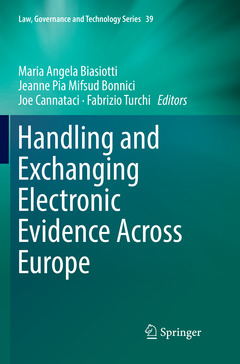Description
Handling and Exchanging Electronic Evidence Across Europe, Softcover reprint of the original 1st ed. 2018
Law, Governance and Technology Series, Vol. 39
Coordinators: Biasiotti Maria Angela, Mifsud Bonnici Jeanne Pia, Cannataci Joe, Turchi Fabrizio
Language: English
Keywords
Digital Forensic; Electronic Evidence; Law Enforcement; Legal framework; Data Privacy; Electronic Evidence in the European Union; ICT and crime; Legal perspective in Treating and Exchanging Digital Evidence; Technical perspective Treating and Exchanging Digital Evidence; Evidence project Environment for Exchanging Digital evidence
Publication date: 12-2018
Support: Print on demand
Publication date: 07-2018
Support: Print on demand
Description
/li>Contents
/li>Biography
/li>Comment
/li>
This volume offers a general overview on the handling and regulating electronic evidence in Europe, presenting a standard for the exchange process. Chapters explore the nature of electronic evidence and readers will learn of the challenges involved in upholding the necessary standards and maintaining the integrity of information. Challenges particularly occur when European Union member states collaborate and evidence is exchanged, as may be the case when solving a cybercrime. One such challenge is that the variety of possible evidences is so wide that potentially anything may become the evidence of a crime. Moreover, the introduction and the extensive use of information and communications technology (ICT) has generated new forms of crimes or new ways of perpetrating them, as well as a new type of evidence.
Contributing authors examine the legal framework in place in various EU member states when dealing with electronic evidence, with prominence given to data protection and privacy issues. Readers may learn about the state of the art tools and standards utilized for treating and exchanging evidence, and existing platforms and environments run by different Law Enforcement Agencies (LEAs) at local and central level. Readers will also discover the operational point of view of LEAs when dealing with electronic evidence, and their requirements and expectations for the future. Finally, readers may consider a proposal for realizing a unique legal framework for governing in a uniform and aligned way the treatment and cross border exchange of electronic evidence in Europe.The use, collection and exchange of electronic evidence in the European Union context and the rules, practises, operational guidelines, standards and tools utilized by LEAs, judges, Public prosecutors and other relevant stakeholders are all covered in this comprehensive work. It will appeal to researchers in both law and computer science, as well as those with an interest in privacy, digital forensics, electronic evidence, legal frameworks and law enforcement.Introduction. Setting the scene for Digital Evidence Exchange in Europe: needs and expectations,( Maria Angela Biasiotti).- International Perspective: The legal perspective in Treating and Exchanging Digital Evidence (Stephen Mason).- The Technical perspective Treating and Exchanging Digital Evidence (Eoghan Casey).- Institutional/operational point of View: invited guests/authors from (TBA).- NFI – Netherlads Forensics Institute.- Siena / UMF standard (Europol).- Legal Mutual Assistance among EU Member States (Eurojust).- CoE –Council of Europe and Cybercrime convention.- EVIDENCE project Perspective: The categorization of the Digital Evidence domain(Sveva Avveduto and CNR team).- The European Legal scenario (Jeanne Mifsud Bonnici, Joe Cannataci).- The Digital Forensics Tools Catalogue(Fabrizio Turchi and Mattia Epifani).- Standards for the Electronic Evidence Exchange(Fabrizio Turchi and Mattia Epifani).- The operational scenario(Sabine Bergs and John Barry).- Privacy protectionin Exchanging Electronic Evidence in Europe(Nikolaus Forgò and Christian Hawellek).- The map of actors and obstacles impacting on the potentialities of Electronic Evidence Exchange(Daniele Mezzana).- The Evidence project Environment for Exchanging Digital evidence in Europe(CETIC).- The way Forward. A Road Map for the European Union(Maria Angela Biasiotti, Joe Cannataci and Jeanne Mifsud Bonnici).
Jeanne Pia Mifsud Bonnici first studied law at the University of Malta where she received a Doctor of Laws degree (LLD) with a thesis on data protection issues in the medical sector. As a Chevening Scholar, she read for a Masters in Cognitive Science at the University of Birmingham, United Kingdom. After some years of teaching and legal practice,sh




